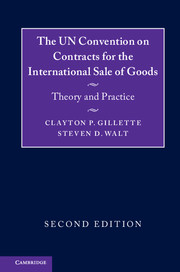Book contents
- Frontmatter
- Contents
- Preface
- 1 The CISG: history, methodology, and construction
- 2 The scope of the CISG
- 3 Contract formation
- 4 Implied terms and interpretation
- 5 Performance
- 6 Liability for nonconformity
- 7 Risk of loss
- 8 Exemption from performance
- 9 Remedies
- Appendix 1 The United Nations Convention on Contracts for the International Sale of Goods
- Appendix 2 CISG status table
- Table of cases
- Subject matter index
Preface
Published online by Cambridge University Press: 05 June 2016
- Frontmatter
- Contents
- Preface
- 1 The CISG: history, methodology, and construction
- 2 The scope of the CISG
- 3 Contract formation
- 4 Implied terms and interpretation
- 5 Performance
- 6 Liability for nonconformity
- 7 Risk of loss
- 8 Exemption from performance
- 9 Remedies
- Appendix 1 The United Nations Convention on Contracts for the International Sale of Goods
- Appendix 2 CISG status table
- Table of cases
- Subject matter index
Summary
In this volume, we explain and comment on the United Nations Convention on Contracts for the International Sale of Goods (CISG), a treaty that regulates the sale of goods among businesses located in different nations. While our focus is on the CISG generally, we are writing in part for an audience that is familiar with different national sales laws. The text at points compares and contrasts the CISG with a sample of these laws, including the Uniform Commercial Code. The purpose of the exercise is to avoid the inference, made by many, that national and international regulatory regimes incorporate identical rules and risk allocations in sales transactions. Our objectives are both to provide information and commentary for commercial law practitioners, and to present a methodological lens, informed by academic literature, for the analysis of commercial law generally.
At the same time, we take an informal theoretical approach to the CISG's provisions that we believe helps illuminate its provisions and assists in their application. This lens suggests that the function of commercial law is to provide default rules that reflect bargains parties would otherwise have reached on their own. In this way, commercial law reduces the costs that attorneys and parties must incur to reach agreement. Analysis of the CISG leads us to be critical of provisions that we find inconsistent with the preferences of commercial parties.
We are indebted to students who performed diligent and thorough research in the preparation of this work. These include Elena Hadjimichael, NYU Law School Class of 2017; Rena Kelley, University of Virginia Law School Class of 2012; Elana Lobo, NYU Law School Class of 2014; Vanessa Richardson, NYU Law School Class of 2013; and Matthew Simon, NYU Law School Class of 2014. Andrew Walker, NYU Law School Class of 2015, reviewed the entire manuscript. Kent Olson of the UVA Law Library was invaluable in discovering source materials. We benefited from numerous substantive conversations with Stefan Krӧll and Joseph Lookofsky. Our greatest intellectual debt is owed to Franco Ferrari, who both encouraged the project and meticulously read and commented on the manuscript. In the process he saved us from numerous errors. Those that remain are attributable only to us. Even more valuable is the constant friendship he provides to both of us.
- Type
- Chapter
- Information
- The UN Convention on Contracts for the International Sale of GoodsTheory and Practice, pp. xi - xiiPublisher: Cambridge University PressPrint publication year: 2016

